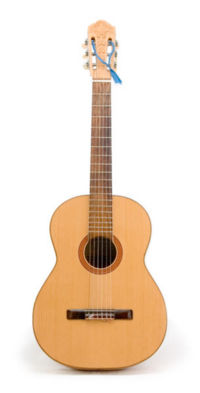Guitar
 From Conservapedia - Reading time: 2 min
From Conservapedia - Reading time: 2 min
The guitar is a stringed musical instrument which is played with the fingers or a guitar pick. Most guitars have six strings; however, there are many people who play guitars with four, seven and twelve strings.
The guitar's ability to play both chords and melodies make it a versatile instrument. The guitar can be found in many contemporary and classical styles of music such as: blues, rock, jazz, country, flamenco and romantic styles.
Types of Guitar[edit]
Guitars can be classified in a few different ways, such as differentiating their construction, playing range or their acoustic/electric quality.
Construction[edit]
Guitars may be classified as being acoustic, semi-acoustic or electric. Acoustic guitars are usually made of wood, and produce sound based on the acoustics which resonate through the hollow chamber of the guitar. These guitars can be used in a live performance without amplification due to the resonance and volume the guitar chamber is capable of producing.
Semi-acoustic guitars are hollow-body acoustic guitars that have been equipped with an electromagnetic pickup so that they can be played either with or without amplification.
Electric guitars are also made out of wood but are usually not crafted in a hollow-body structure to allow the strings to resonate into the chamber. These guitars usually have electromagnetic pickups installed which are led to an amplifier to amplify the sound being played.
Range[edit]
Guitars can also be classified according to their range capabilities. Electric guitars have a 4-octave range, while bass guitars have a 3-octave range which is one-octave lower than the electric guitar's range. There also exist seven and eight (although the latter are not common) stringed guitars which usually extend the bass range.
Tuning[edit]
There are many tunings used for the guitar around the world. There is however, a tuning commonly known as "standard tuning", being (low to high) EADGBE. This tuning has been considered as the standard since the late 18th century.[1] There are alternate tunings commonly used, such as drop-D tuning (lowering the sixth string by a whole tone to D), D modal tuning (DADGAD), open-C tuning (CGCGCE) and open-G (DGDGBD) tuning. The tuning of the guitar can have a noticeable effect on the timbral quality of the notes produced.
In standard tuning, the guitar has a usual range of four octaves, ranging from E2 to around E6 (on a 24-fret guitar). This standard range can be broadened by using basic guitar techniques such as bending a note to raise its pitch, or by using a vibrato-arm on an electric guitar to lower its pitch.
 KSF
KSF